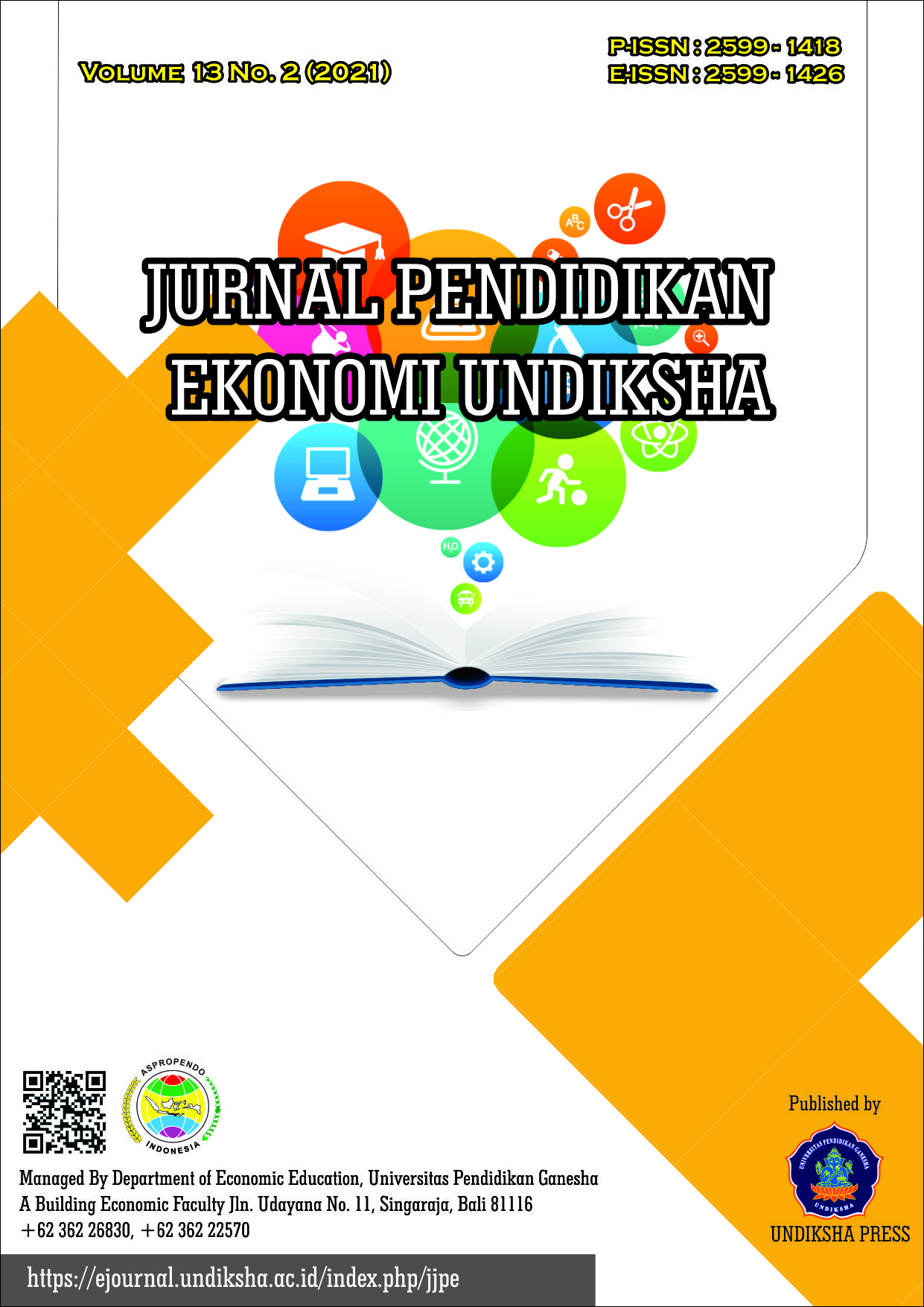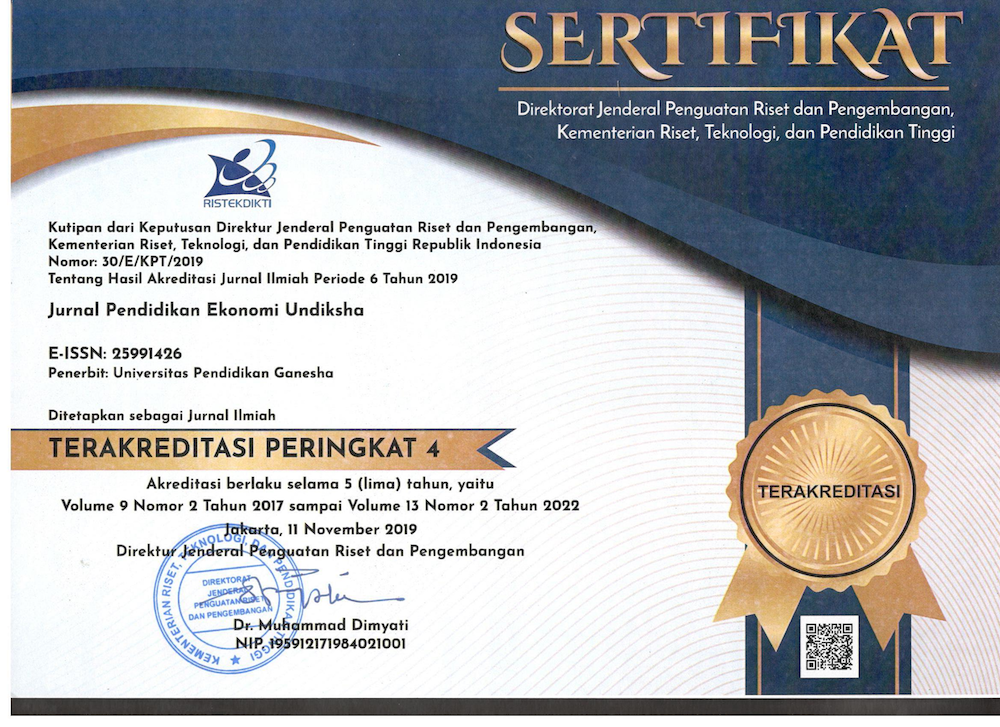Persepsi Konsumen Terhadap Peraturan Gubernur Bali No.97 Tahun 2018 Tentang Pembatasan Timbulan Sampah Plastik Sekali Pakai di Kecamatan Mendoyo, Jembrana, Bali
DOI:
https://doi.org/10.23887/jjpe.v13i2.33650Keywords:
Perception, Consumer, Bali Governor Regulation Number 97 of 2018Abstract
The purpose of this study is to identify consumer perception towards Bali Governor Regulation Number 97 of 2018 on restrictions of disposable plastic waste. This research used a descriptive type research to analyze consumer perception towards Bali Governor Regulation Number 97 of 2018 on restrictions of disposable plastic waste. The population in this study include all consumers in Mendoyo Subdistrict, Jembrana Regency, Bali. This research used incidental sampling techniques which and obtained samples as many as 330 people. The results of this study were categorized in several dimensions namely dimension of need which obtained a score of 4,144 in the score range of 3,366 - 4,158 thus it is categorized as highly favorable, dimension of expectation obtained a score of 16,603 in the score range of 14,586 - 18,018 thus it is categorized as highly favorable, and dimension of experience obtained a score of 6,625 in the score range of 5,147 - 6,731 thus it is categorized as favorable.
References
Badan Pusat Statistik Provinsi Bali. (2019). Jumlah Kunjungan Wisatawan Mancanegara dan Domestik tahun 2018. Data per Desember 2018.
Biswas, Aindrila & Roy. (2015). Green Products: An Exploratory Study On The Consumer Behavior In Emerging Economies Of The East. Journal Of Cleaner Production. 87 (1).
Chekima, B., Azizi, S., Syed, W., Wafa, K. (2016). Examining Green Consumerism Motivational Drivers : Does 10 Premium Price And Demographics Matter To Green Purchasing. Journal of Cleaner Production. 112, 3436–3450.
Fauzi Akbar, Z. A. (2013). Pengaruh Waktu Simpan Film Plastik Biodegradasi dari Pati Kulit Singkong Terhadap Sifat Mekanikalnya. Jurnal Teknik Kimia USU. 2 (2). 11-15.
Jahani, Akram. Tahereh Dedari & Mahdi Farzadkia. (2019). Iranian Experiences In Terms Of Consumption Of Disposable Single- Use Plastics: Introduction To Theoretical Variables For Developing Environmental Health Promotion Efforts. Science Direct. (16)18-22.
North, Emily J & Halden. (2013). Plastics and Environmental Health: The Road Ahead. Reviews on Environmental Health. 28 (1).
Peraturan Gubernur Provinsi Bali No. 97 Tahun 2018 Tentang Pembatasan Timbulan Sampah Plastik Sekali Paka.
Prihartini, Erni Alfisah., & Ade Mayvita. (2017). Persepsi Dan Reaksi Konsumen Terhadap Pemberlakuan Pelarangan Penggunaan Kantong Plastik Sebagai Kemasan Pada Pusat Perbelanjaan Modern ( Studi Konsumen Di Lingkungan Uniska Mab Banjarmasin). Jurnal Ekonomi dan Manajemen. 3(1). 527-537.
Santos, T.R. and A.C. Duarte. (2015). A Critical Overview of The Analytical Approaches to The Occurrence, The Fate and the Behavior of Microplastics in the Environment. Trends in Analytical Chemistry. (65) 47–53.
Setyowati, R., & Mulasari, S. A. (2013). Pengetahuan Dan Perilaku Ibu Rumah Tangga Dalam Pengelolaan Sampah Plastik. Kesmas: National Public Health Journal. 7(12). 562-566.
Suryani, A. S. (2017). Persepsi Masyarakat dan Analisis Willingness To Pay Terhadap Kebijakan Kantong Plastik Berbayar Studi Di Jakarta dan Bandung. Kajian. 21(4). 359-376.
Van Rensburg, Melissa L. S'phumelele L.Nkomo & Timothy Dube. (2020). The ‘Plastic Waste Era’; Social Perceptions Towards Single-Use Plastic Consumption And Impacts On The Marine Environment In Durban, South Africa. Science Direct. Volume 114
Wilcox, Lynn. (2012). Psikologi Kepribadian. Yogyakarta: IRCISoD.
Yuliana, Surroya. (2016). Kajian Terhadap Kebijakan Kantong Plastik Berbayar Berdasarkan Analisis Perilaku Konsumen. Skripsi. Institut Teknologi Sepuluh November.





